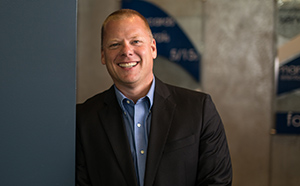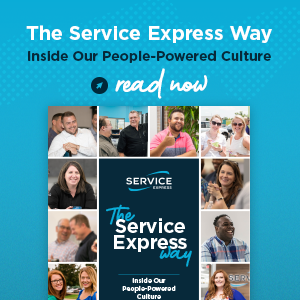All failure is not created equal. Failure is limited to defeat when we don’t walk away from it having learned something that we didn’t know before or if we didn’t try again.
If you don’t succeed the first time, don’t try harder the next time, try smarter.
Organizations must create cultures that embrace risk, grow as a result of failure, and scale success, if they want to create sustainable growth. Here’s how.
Minimize the Effect of Failure and Scale Success
At Service Express we begin small so that the effects of failure are minimal and then we scale for success.
As an example, after developing an online “portal” to meet a customer’s need, we invited a handful of additional customers to test the portal with us prior to a large-scale launch. With their input we were able to better identify what worked and what didn’t. Had we launched the portal to all our customers it would have been a frustrating experience for them and for us as we worked out the bugs.
[mks_pullquote align=”right” width=”300″ size=”18″ bg_color=”#00acc6″ txt_color=”#ffffff”]Starting small minimizes the effects of failure, and just as important, it takes pressure off of our employees to try to be perfect the first time.[/mks_pullquote]Starting small minimizes the effects of failure, and just as important, it takes pressure off of our employees to try to be perfect the first time.They have license to innovate, develop solutions, and refine their work.
How to Fail Forward
Failure happens. When it does we must be intentional about leveraging it for growth. We can do that by reexamining, reengineering and redeploying.
Reexamine (Look back)
Conduct a post-mortem. At Service Express we’re big on performance measurement. We try to make sure that there is planning for everything that we do and that there’s a way to measure success and failure. We cannot effectively adjust if we don’t benchmark and measure. We identify process failures based on objective data, not on emotion.
Reengineer (Look forward)
Based on the post-mortem, make adjustments. Change those things that didn’t work well and keep those that did.
Sometimes failure means that it wasn’t meant to be, and that’s ok. We don’t always know this without trying. I’ve found that many small “dead-ends” often lead to great success.
Redeploy
Too often people develop an unreasonable fear of failure and have trouble trying again. Trying something new is difficult to do when a culture doesn’t encourage risk and embrace failure.
Almost every success we’ve experienced at SEI was born from failure.
Those who succeed learn from the experiences of failure and engineer a smarter way.
Failure and Success are Synonymous
There’s a line in the movie Rocky that’s applicable to those of us in business. “It isn’t about how hard you can hit, it’s about how hard you can get hit and keep moving.”
Almost every great success in history was preceded by failure. In each case, individuals were presented with a choice, sometimes thousands of times, to accept failure or to learn from it.
Henry Ford failed five times and went bankrupt before developing a new process- the assembly line, which became a benchmark for Ford Motor’s success.
Thomas Edison created over 1,000 different iterations of the light bulb before he finally succeeded in making one that worked.
In order to make history, leaders must intentionally create cultures that encourage risk, embrace failure and scale success.

